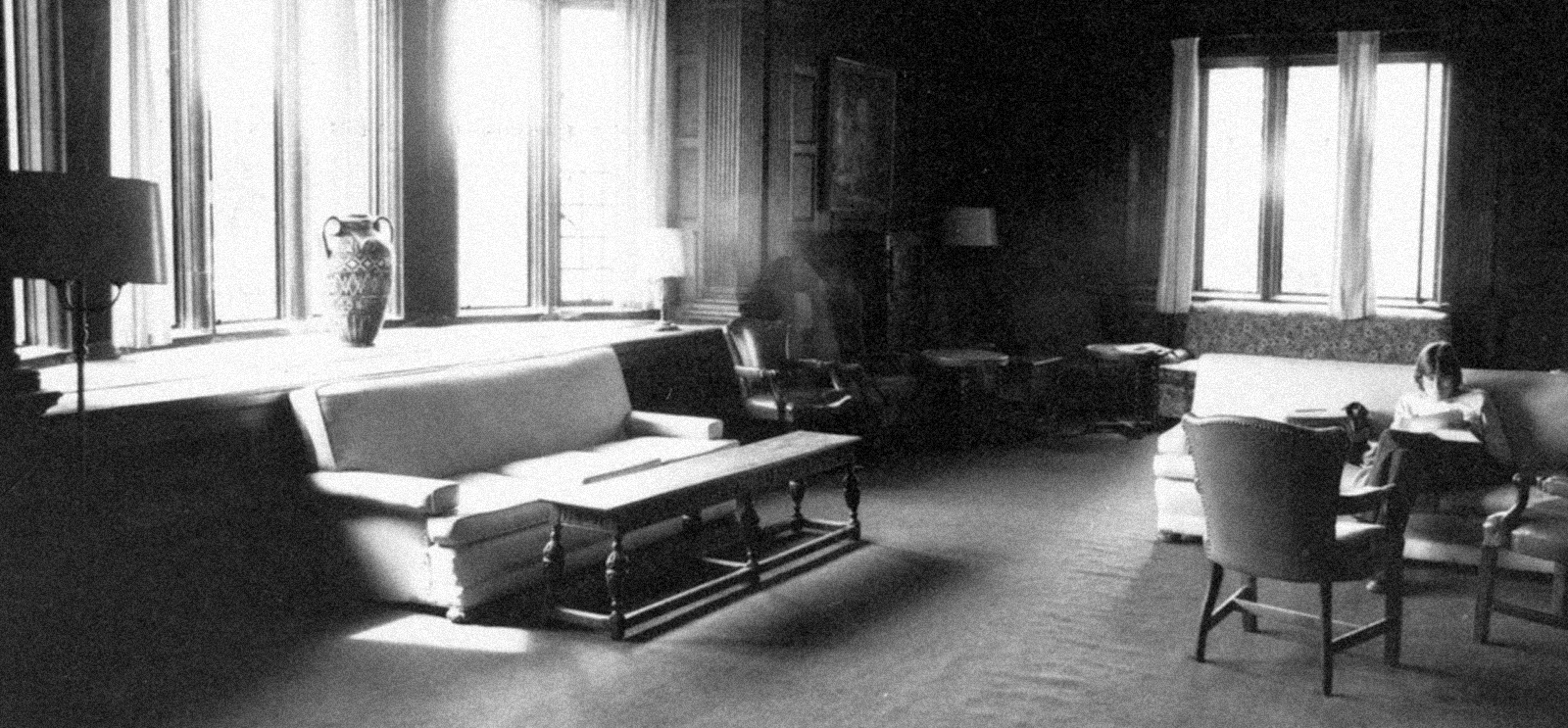
A student studies in the Tea Room on the second floor of the Social Science Research Building, undated. (University of Chicago Photographic Archive, apf7-02612, Special Collections Research Center, University of Chicago Library)
Alumni from the past 50 years recall their experiences in the Division of the Social Sciences.
Why did you study at UChicago?
Judith Farquhar, AM’75, AM’79, PhD’86 (Anthropology), the Max Palevsky Professor Emerita of Anthropology and Social Sciences: I dropped out of college and worked as a research assistant at the National Institutes of Health. My supervisor there pushed me to go back to school, and he found out that Chicago would accept graduate students without a BA. I did the MA program while on leave from NIH. I realized I wanted a life devoted to reading, writing, and teaching, so after a break I returned to Chicago for the PhD program in anthropology.
Yuval Levin, AM’02, PhD’10 (Social Thought), policy analyst and editor of the journal National Affairs: Beneath the policy debates there is a set of differences about the nature of a free society and the purpose of politics that gives shape to distinct approaches to politics in our liberal democracy. I wanted to understand these differences better and concluded that there was no better place to study it than the Committee on Social Thought at Chicago.
What did your research focus on?
Judith V. Torney-Purta AM’62, PhD’65 (Human Development), professor emerita of human development, University of Maryland: In 1961 I was offered a position for $125 a month—enough to pay my rent!—as a research assistant on a project studying children’s political socialization. To do my dissertation analysis I had to manage 12,000 cards using a card sorter before sending them with my programmer to the computer center; he carried them in his bicycle basket.
Camille Henderson Davis, AM’99, PhD’05 (History), owner of the Santa Monica–based interior-design firm Design Adventures: The history of US race relations, race theory, and change management. As an interracial student, I wanted to understand the evolution of race in America and examine how we had come so far and how we could overcome obstacles to continued progress.
Aida Giachello, AM’71, PhD’88 (Sociology), professor of preventive medicine, Northwestern University Feinberg School of Medicine: While working toward my PhD, I started working full time as a medical social worker for the Chicago Department of Public Health. I was assigned to a neighborhood health center in the Pilsen community, where I discovered a passion for health-care issues. I became aware of the barriers faced by vulnerable populations in getting access to quality medical care.
Who influenced you most while you were at the University?
Brent Staples, AM’76, PhD’82 (Behavioral Sciences), editorial writer, the New York Times: I experienced several distinguished teachers and thinkers, but I was particularly smitten by a class I took with the French philosopher Paul Ricœur. His monumental work Freud and Philosophy traces the roots of Freudian thought to principals derived from hydraulics and other components of the industrial revolution. He encouraged students to examine the underpinnings of ideas and to find out where they came from and what made them tick.
Levin: Leon Kass, LAB’54, SB’58, MD’62, a legendary professor in the Committee on Social Thought, took a characteristically UChicago approach to the study of deep philosophical and social questions. He showed us how to take important texts seriously while also interrogating them with intensity. Studying with him was like learning how to read all over again and realizing I’d never quite known how to do it before.
Henderson Davis: Historian Tom Holt’s seminar on race theory. His admonition that we examine “how race works” and “the work race does” in America continues to guide my thinking.
What did you do to blow off steam to counteract the intellectual rigor of UChicago?
Torney-Purta: While I was living in Pilsen in the mid-1960s, I organized a children’s choir that traveled around the city to give concerts and was among the first of its kind. I organized a second choir a few years later with Japanese American girls from the North Side.
Staples: I was a distance runner at the time. I ran for miles and miles—rain, snow, or shine—along the shore of Lake Michigan. I played basketball now and then with intramural teams.
Giachello: My late husband, Stelvio Giachello, helped me in balancing my school and family responsibilities. Ronald Andersen, director of the Center for Health Administration Studies, arranged barbecues and dinners every quarter at his house where faculty, staff, students, and their families celebrated special occasions. Those were wonderful opportunities for me to have fun and to forget about work.
Levin: I came to Chicago for the rigor, so I enjoyed it immensely and rarely found myself in much need of blowing off steam. When I did, it was mostly with fellow graduate students enjoying the city on our shoestring budgets.
What mantra has stayed with you since getting your degree?
Henderson Davis: In my first year, my seminar professor, Kathy Conzen, constantly pushed us to dig deeper into the data, the discussion, and our own ideas. I still use that advice every day.
Farquhar: When I was about to leave my dissertation field site in Guangzhou, China, my adviser told his boss, “She is our bridge to the world.” I was touched by his remark, uttered at a time when scholarly exchange between China and the US was troubled.
Torney-Purta: If you encounter someone with a University of Chicago degree, know that you are with an individual who is extraordinarily well educated and thoughtful.
